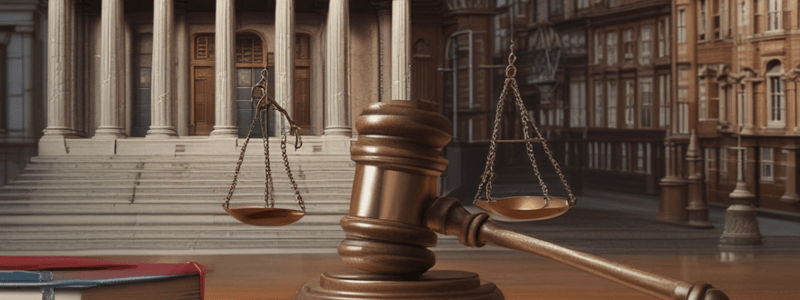Podcast
Questions and Answers
What was the key issue in the case of S.W. v. the United Kingdom?
What was the key issue in the case of S.W. v. the United Kingdom?
- Whether the applicant's actions were considered legal at the time they were committed
- Whether the applicant's use of physical force to remove his wife from their home was justified
- Whether the applicant's wife could legally end their marriage in 1990
- Whether the applicant's prosecution for rape was consistent with the principle of legality in criminal law (correct)
Which of the following best describes the principle of legality in criminal law?
Which of the following best describes the principle of legality in criminal law?
- The principle that criminal laws should be applied retroactively to past actions
- The principle that criminal laws should be prospective and not applied retroactively (correct)
- The principle that criminal laws should be interpreted strictly and narrowly
- The principle that criminal laws should be flexible and adaptable to changing social norms
How did the European Convention on Human Rights play a role in the S.W. v. the United Kingdom case?
How did the European Convention on Human Rights play a role in the S.W. v. the United Kingdom case?
- The European Convention on Human Rights prohibited the UK from prosecuting the applicant for rape, since it was legal at the time
- The European Convention on Human Rights allowed the UK to interpret the principle of legality in criminal law in a way that permitted the applicant's prosecution for rape (correct)
- The European Convention on Human Rights required the UK to prosecute the applicant for rape, despite it being legal at the time
- The European Convention on Human Rights was not relevant to the S.W. v. the United Kingdom case
What was the outcome of the S.W. v. the United Kingdom case?
What was the outcome of the S.W. v. the United Kingdom case?
How did the S.W. v. the United Kingdom case contribute to the understanding of the relationship between criminal law and changing social norms?
How did the S.W. v. the United Kingdom case contribute to the understanding of the relationship between criminal law and changing social norms?
What was the key factor that enabled the prosecution of the applicant for rape in the S.W. v. the United Kingdom case, despite it being legal at the time?
What was the key factor that enabled the prosecution of the applicant for rape in the S.W. v. the United Kingdom case, despite it being legal at the time?
What is the primary challenge faced by legal systems?
What is the primary challenge faced by legal systems?
What does the text suggest about the boundaries of law?
What does the text suggest about the boundaries of law?
What is the significance of the case of SW versus the United Kingdom?
What is the significance of the case of SW versus the United Kingdom?
What does the text suggest about the idea of a crime being always wrong but not recognized?
What does the text suggest about the idea of a crime being always wrong but not recognized?
What is the overarching message conveyed by the text?
What is the overarching message conveyed by the text?
What was the defendant's primary argument in taking his case to the European Court of Human Rights?
What was the defendant's primary argument in taking his case to the European Court of Human Rights?
What was the key principle that Csar Hebegarria, an Enlightenment thinker, argued for in his work on crime and punishment?
What was the key principle that Csar Hebegarria, an Enlightenment thinker, argued for in his work on crime and punishment?
What was the key concept underlying the principle of legality as enshrined in the European Convention on Human Rights?
What was the key concept underlying the principle of legality as enshrined in the European Convention on Human Rights?
What was the key issue at the heart of the legal debate in the case?
What was the key issue at the heart of the legal debate in the case?
What was the European Court's reasoning in finding that the UK did not violate the non-retroactivity principle?
What was the European Court's reasoning in finding that the UK did not violate the non-retroactivity principle?
What was the European Court's rationale for stating that the 'abandonment of the unacceptable idea of a husband being immune against prosecution for rape of his wife' was in conformity with the fundamental objectives of the European Convention on Human Rights?
What was the European Court's rationale for stating that the 'abandonment of the unacceptable idea of a husband being immune against prosecution for rape of his wife' was in conformity with the fundamental objectives of the European Convention on Human Rights?
What was the key implication of the European Court's decision in this case?
What was the key implication of the European Court's decision in this case?
What was the key principle that the European Court of Human Rights emphasized in its 1995 decision regarding the case?
What was the key principle that the European Court of Human Rights emphasized in its 1995 decision regarding the case?
What was the key question that the case forced us to consider regarding the criminal legal system?
What was the key question that the case forced us to consider regarding the criminal legal system?
What was the key rationale behind the principle of legality as described by Csar Hebegarria, the Enlightenment thinker?
What was the key rationale behind the principle of legality as described by Csar Hebegarria, the Enlightenment thinker?



